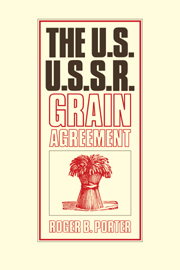Book contents
- Frontmatter
- Contents
- Foreword
- Preface
- List of acronyms used in the text
- 1 Introduction
- 2 U.S.–Soviet grain trade before 1974
- 3 The 1974 experience
- 4 The Russians return
- 5 First steps
- 6 A strategy emerges
- 7 Agreement to seek a long-term arrangement
- 8 Refining the details
- 9 Ebbing leverage: the waiting game
- 10 Evaluations
- 11 Reflections
- Epilogue
- Appendices
- Bibliography
- Index
- Frontmatter
- Contents
- Foreword
- Preface
- List of acronyms used in the text
- 1 Introduction
- 2 U.S.–Soviet grain trade before 1974
- 3 The 1974 experience
- 4 The Russians return
- 5 First steps
- 6 A strategy emerges
- 7 Agreement to seek a long-term arrangement
- 8 Refining the details
- 9 Ebbing leverage: the waiting game
- 10 Evaluations
- 11 Reflections
- Epilogue
- Appendices
- Bibliography
- Index
Summary
EVALUATING THE AGREEMENT
During its first three years, the grain agreement fulfilled the objectives of its architects. The United States had acquired an assured market of at least 6 million tons annually where before it had none. In the first year of the agreement (October 1976 to September 1977), the Soviet Union purchased 6.116 million tons of grain (3.064 million tons of wheat and 3.052 million tons of corn) during a year in which their own harvest of 223.8 million tons was large enough to have met their own needs without any imports. One knowledgeable USDA official observed that based on past behavior, in the absence of the agreement, the Soviets likely would have made few if any purchases in the U.S. market during the 1976–77 crop year.
The agreement had also reduced Soviet disruption of U.S. and international grain markets because of the requirement for consultations and U.S. government approval of Soviet purchases exceeding 8 million tons in any crop year. In the second year of the agreement, a poor Soviet crop of 195.7 million tons led to Soviet purchases of 14.585 million tons of U.S. grain (11.132 million tons of corn and 3.453 million tons of wheat). But these purchases were made following consultations and U.S. government approval. In the first year the agreement assured a market. In the second year, it handled large purchases with minimum disruption.
- Type
- Chapter
- Information
- The U.S.-U.S.S.R. Grain Agreement , pp. 91 - 102Publisher: Cambridge University PressPrint publication year: 1984



